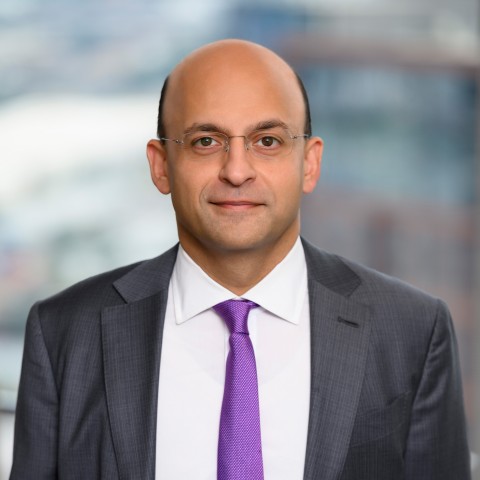Our planet’s climate trajectory for the next 15 years is already decided, scientists warn—but what actions investors take today can still have tremendous impact. New research by PGIM, the $1.5 trillion global investment management business of Prudential Financial, Inc. ( NYSE: PRU ), finds that while most investors recognize climate change as a major risk, too few see the opportunities ahead that will help pave our way to a greener economy.
This press release features multimedia. View the full release here: https://www.businesswire.com/news/home/20210211005048/en/

Chief Operating Officer, PGIM (Photo: Business Wire)
The research, Weathering Climate Change: Opportunities and Risks in an Altered Investment Landscape , draws from the insights of more than 45 investment professionals across PGIM’s fixed income, equity, real estate, private debt and alternatives businesses; interviews with 30 leading academics, economists, policy-makers, scientists and climate change investors; and a proprietary survey of 100 global institutional investors to better understand their current strategies around climate change.
According to PGIM’s survey, nearly 90% of global investors believe climate change is very or somewhat important but 40% have yet to incorporate it into their investment process.
“The humanitarian and economic catastrophe unleashed by COVID-19 revealed investor’s vulnerability to slow-burning risks with unpredictable timing,” says Taimur Hyat, PGIM’s chief operating officer. “Climate change is the next crisis that will radically reshape investors’ risks and opportunities. Investors that take action now can play an influential role in driving the global transition to a low-carbon economy while optimizing their portfolios for a greener future.”
The research demonstrates that markets have only just begun to reflect climate risks in asset prices and predicts that a range of catalysts will accelerate the gradual, or potentially abrupt, repricing of assets to more fully reflect climate risks. This mispricing of climate risks creates opportunities for active, long-term investors. These range from identifying tech-forward companies adept at transitioning to the new “low-carbon economy,” to incorporating physical and transition climate risk in analyzing real assets, to supporting startups engaged with transformative technologies like carbon capture and storage.
Among the research findings:
- Not enough investors use alternative data sources and techniques to better understand cross-portfolio climate risk. Fewer than one in five use alternative data such as satellite imagery, flooding maps, drought data and air quality data. Overlaying the geolocation of key production and supplier facilities with climate data and analytics can reveal which operations are exposed to physical climate risk.
- Expect the greenest firms within brown industries to outperform. The evolution away from fossil fuels will play out over a significantly longer time horizon than many investors might expect. Investors can actively influence fossil fuel users and extractors to employ more sustainable practices and positively impact carbon emission outcomes over the decades-long wind-down period.
- Investors may need to apply a climate change lens to sovereign debt. Nearly 25% of investors view climate as a risk for sovereign debt, while only 4% view it as an opportunity. However, countries with similar credit ratings and yields exhibit wide variations in both climate change vulnerability and resilience, allowing investors to take advantage of the eventual repricing of sovereign debt around climate risk.
- Not all “at-risk” real estate is at risk. Sophisticated real estate investors can uncover situations where the broader market sees limited value. For example, investors can consider high-risk locations by factoring in resilience-boosting capital expenditures into their models for capitalization rates and cash flows.
- Investors must look beyond the obvious physical risks to uncover “hidden” climate risks across their portfolios. As the coronavirus pandemic has laid bare, supply chains represent key vulnerabilities for manufacturers. Climate change has the potential to unleash the same kind of disruptive impact through supply chains and industries not typically considered as having high climate risk, for example, semiconductors and pharmaceuticals.
For more, visit the microsite for Weathering Climate Change: Opportunities and Risks in an Altered Investment Landscape , the latest in PGIM’s Megatrends series .
ABOUT PGIM
PGIM , the global asset management business of Prudential Financial, Inc. ( NYSE: PRU ), ranks among the top 10 largest asset managers in the world* with $1.5 trillion in assets under management as of December 31, 2020. With offices in 16 countries, PGIM’s businesses offer a range of investment solutions for retail and institutional investors around the world across a broad range of asset classes, including public fixed income, private fixed income, fundamental equity, quantitative equity, real estate and alternatives. For more information about PGIM, visit pgim.com .
Prudential Financial, Inc. (PFI) of the United States is not affiliated in any manner with Prudential plc, incorporated in the United Kingdom or with Prudential Assurance Company, a subsidiary of M&G plc, incorporated in the United Kingdom. For more information please visit news.prudential.com .
* Prudential Financial Inc. (PFI) is the 10th largest investment manager (out of 527 firms surveyed) in terms of global assets under management based on Pensions & Investments’ Top Money Managers list published on June 1, 2020. This ranking represents global assets under management by PFI as of March 31, 2020.

View source version on businesswire.com: https://www.businesswire.com/news/home/20210211005048/en/
Julia O’Brien
+1 862 754 0005
julia.obrien@pgim.com